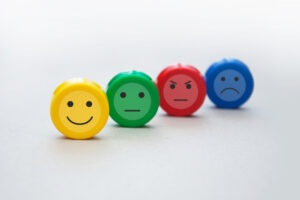Importance of Psychology in Digital Marketing

Understanding human behavior is crucial in today’s digital era, as it influences consumer decisions. Knowing psychological triggers can give businesses an advantage in online marketing. This knowledge helps reach target audiences more effectively and connects them on a deeper, more personal level.
The intersection of psychology and digital marketing is where the mind meets the market, and we’ll break down the essential aspects of psychology in digital marketing below so you can use it for your business or venture.
Defining Terms
Before digging into why psychology in digital marketing is so important, you must understand two important terms. They are:
Digital Psychology
Digital psychology, also called “web psychology,” is a relatively new field that combines digital marketing with studying how people think and act to make content that appeals to our subconscious. As part of this, digital psychologists study how people act online to determine why people act the way they do. Understanding those behaviors better will help us determine how to position ourselves online.
Marketing Psychology
Marketing psychology examines how marketing techniques can change our thoughts, feelings, and actions. “Neuromarketing” is another name for marketing psychology methods. As marketers, we can use these to make strategies that work and help the right prospects along the customer journey to purchase. You will learn the science behind why people make their choices here, which you can use in your marketing plan.
How It Applies to Marketing
When you’re first learning how to use psychology in marketing, you may wonder how it can help your marketing team develop a better psychology marketing strategy. There are several ways to accomplish this, including:
Ways It Helps Marketers
- Understand Customers – Psychologists help marketers understand what drives and fears their audience, allowing them to make deeper and more meaningful campaigns.
- Increase Conversions – Marketers can subtly get people to do what they want using cognitive biases or principles.
- Bounce Rates – Using psychology in web design ensures visitors’ needs are met, which lowers the number of quick exits.
- Increase Spend per Transaction – People want to feel like they are getting something valuable and unique, so you can use upselling, cross-selling, or just showing off your best options to get them to spend more on each purchase.
- Customer Retention – Marketers can develop ways to keep customers returning if they understand the psychology behind community, trust, and loyalty.
- Testing – Psychological theories support A/B or split testing. Marketers can test a campaign or webpage to see which works best with their audience and use the feedback to make real-time changes.
Psychology Principles for Marketing
If you’re wondering, “How psychology is used in marketing?” you’ll be pleasantly surprised to find several principles you can learn and use. They include:
Loss Aversion/Exclusivity
The idea behind loss aversion is that people feel the pain of losing something much more than the pleasure of gaining something of equal value. There’s a greater chance that people are scared of losing what they have than excited about new things. On the other hand, exclusivity encompasses a desire for limited or rare items, which can make a product or service seem much more valuable.
- Example – Some high-end brands release limited edition items, and some service providers give premium members early access to new features, making membership more appealing.
Social Proof
Social proof is an aspect of psychology where people look to the actions and opinions of others to guide their actions, mainly when they are unsure.
- Example: Social proof helps brands promote their products and services. Potential buyers trust peer opinions, so showing customer reviews or testimonials on a website can influence them. Adding “Over 10,000 sold!” to a product’s description shows its popularity.
Decoy Effect
The decoy effect, or asymmetric dominance, is when a third, less appealing option makes one of the original two seem more attractive.
- Example: Businesses use this to nudge customers to pick a specific choice. For example, a movie theater may have a small popcorn for $3, a medium for $7, and a large for $8. The medium popcorn is the decoy because when people see they have to pay just a dollar more for a large, they think it’s the better value.
Reciprocity
The human instinct to respond to a positive action with another positive action is called reciprocity.
- Example: Marketers use free samples or bonuses to encourage customers to make future purchases, like a coffee shop offering a complimentary muffin with a large coffee.
Color Psychology
Color psychology studies how different colors can evoke specific emotions or behaviors in individuals.
- Example: Brands use colors like blue in their logos or campaigns to try and bring out desired emotions like trust and reliability, as seen in tech companies.
Emotional Psychology
Emotional psychology looks at how emotions drive human behavior.
- Example: Marketers create emotional-driven campaigns, like holiday ads, to connect with their audience, evoking emotions like joy or nostalgia to encourage gift purchases.
Grounded Cognition
Grounded cognition suggests that thinking has deep links to sensory experiences and environmental actions.
- Example: Interactive ads and experiences that allow users to touch or feel a product, like a car website, can enhance its memorability.
Information-Gap Theory
This theory suggests that people need to fill gaps in their knowledge, making them look for missing information.
- Example: Marketers use teasers or partial reveals of new products to pique potential customers’ curiosity, similar to a movie trailer revealing just enough to spark interest.
The Impact of User Experience
When you look at digital marketing psychology, it has a lasting impact on the user experience. Surprisingly, even the smallest choices can have a lasting effect, including:
- Typography – The font and layout directly impact readability, affecting how easily users absorb content and navigate around a site.
- Web Design – A well-designed website guarantees accessibility and a pleasing look, which impacts user satisfaction and time spent on a site.
- Mobile-First – Prioritizing mobile design ensures a seamless experience for many users, resulting in more engagement and reduced frustration on smaller screens.
How Youtech Can Help
Youtech can do several things to help your company when it comes to social psychology marketing, including:
- Cognitive Bias – Youtech uses an understanding of cognitive biases to create marketing strategies that are deeply felt by users, urging them towards desired actions and decisions.
- Customer Experience – Youtech’s expertise in user-centric design and process ensures that every customer touchpoint gets optimized for a seamless and memorable customer experience, increasing satisfaction and retention.
- Trust and Credibility – Youtech helps brands build and maintain a strong reputation by using transparent practices and consistent messaging, establishing long-term trust with the audience.
Youtech Will Help Build a Brand Your Customers Believe In
Blending psychology into your digital marketing strategies can be challenging, but this is where we excel at Youtech. No matter your company size, we’ll help your team develop strategies to help you build trusting relationships with your customer base and improve your bottom line. Reach out to get started.
Comments are closed.
